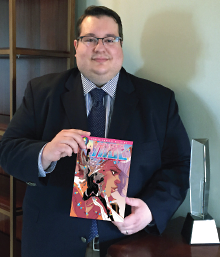As Brooklyn-based fashion designer Alexis Pope commutes to an appointment with her psychiatrist, signs of the stigma associated with mental illness surround her: a marquis advertises the latest horror movie about a “homicidal maniac”; newspaper headlines proclaim a mass shooter to be mentally ill; a seat on a crowded subway remains empty next to a homeless passenger who responds to voices no one else can hear.
Pope ponders a year of recovery from a suicide attempt, subsequent hospitalization and diagnosis of bipolar disorder, comorbid migraines, and medication trials that eventually stabilized her mood—struggles common to many patients.
But Pope isn’t your average bipolar patient.
She’s a superhero.
When she learns of a nearby helicopter crash, she transforms into her alter ego, Aura, and soars into action. The harbinger of her migraines—a rainbow-tinged visual aura—transforms her thoughts into physical projections and allows her to fly and levitate objects, all with the power of her mind. “I feel … powerful,” she says to herself as she leaps to action.
Aura is an award-winning comic short story penned by Vasilis Pozios, M.D., president of the Michigan Psychiatric Society and co-founder of Broadcast Thought Inc., a consulting group that advocates for more accurate and less stigmatizing representations of people with mental illness in the media.
Pozios, a lifelong comic book reader, told Psychiatric News that comic books have never been more mainstream, serving as a primary source of content for multibillion dollar film franchises, TV series, and video game adaptations.
However, comic books often portray villains as not only evil and violent, but as having a mental illness, Pozios noted. An example would be the Joker from DC Comics’ Batman series, for instance. Through related media, comic books have the potential to perpetuate such stigmatizing inaccuracies to broader audiences.
“That’s why I thought it was important to create a character living with mental illness who is a hero, not a villain,” Pozios said. He noted that comic books also have a long tradition of social justice advocacy and can play a pivotal role in changing how people with mental illness are represented in entertainment media.
Like many people living with a mental illness, Aura’s bipolar disorder doesn’t define her. But as a superhero whose mind is the source of her power, when her illness is not controlled, the ensuing chaos not only highlights the importance of treatment adherence, but allows for unique storytelling opportunities.
“If we can provide an example of an accurate portrayal of people living with mental illness in a nonstigmatizing way that is also entertaining, that may encourage future writers and others in the entertainment industry to do the same,” Pozios said.
Pozios noted that the character of Aura was based on his experiences of treating patients with bipolar disorder, and so far he has received “humbling” feedback from readers regarding his short story, which features art by Marguerite Sauvage and appeared in the March 2015 edition of RISE: Comics Against Bullying #2 from Northwest Press.
“In one case,” Pozios said, “a reader wrote to me and said that reading about Aura had inspired her to continue living. … I don’t even know how to process that kind of feedback.”
Aura has received recognition by the entertainment industry as well. Pozios received the PRISM Award in July 2015 for his accurate depiction of mental health issues in a comic book or graphic novel storyline from the Entertainment Industries Council Inc. in collaboration with FX Network and other national cable TV area partners. The PRISM Awards, which were established in 1997, honor productions that are not only powerfully entertaining, but also realistically portray people with mental illnesses.
Pozios said that current misrepresentations of fictional characters with mental illness in the media may be rooted in misconceptions that have been perpetuated through the decades. “Like a game of telephone, these misconceptions of mental illness can snowball out of control.”
As he noted, few TV shows either have the budget or time to consult with medical experts or someone who is living with a mental disorder to ensure accuracy in the script. Pozios contended that this underscores the need for psychiatrists to take an active role in initiating such collaboration.
While Aura was a short story that appeared as part of a larger anthology series, Pozios would like to develop Aura so it can be published on a monthly basis or as an original graphic novel, he noted.
“I hope I can be an inspiration for other psychiatrists who are interested in improving how mental illnesses are portrayed in the media,” Pozios said. “To reduce mental health stigma, we need to change the culture that created it. That is what I’m hoping to do in some small way.” ■


